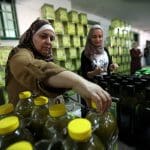
In recent years, Palestine solidarity activists have pressured corporations to end their complicity in the Israeli regime’s violations of Palestinians’ rights. As a result, companies like Ben & Jerry’s, Veolia, and Pillsbury, among others, have pulled their products and services from Israeli markets, albeit to varying extents. How, exactly, have these successes been achieved? What are some of their limitations, and how hopeful should we be for a proliferation in corporate boycotts of Israel?
To answer these questions and more, host Nadim Bawalsa was joined by Sandra Tamari and Omar Barghouti for Al-Shabaka’s first policy lab of 2023.
Omar Barghouti is a Palestinian human rights defender and co-founder of the Palestinian-led Boycott, Divestment and Sanctions (BDS) movement for Palestinian rights. He is a...
Nadim Bawalsa is Associate Editor with the Journal of Palestine Studies. From 2020-2023, Nadim served as Al-Shabaka’s commissioning editor. He is a historian of modern...













